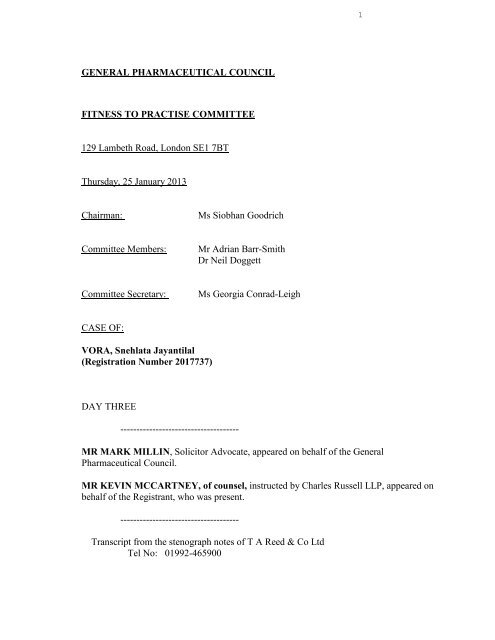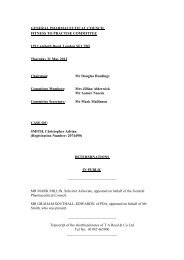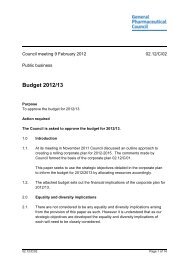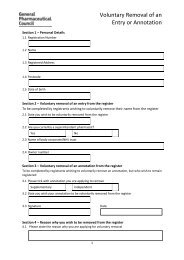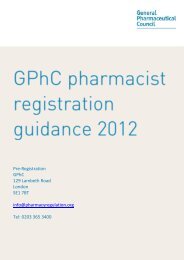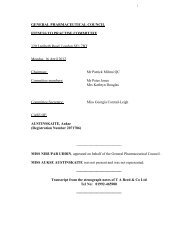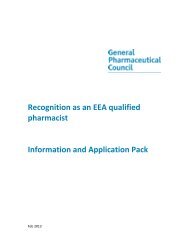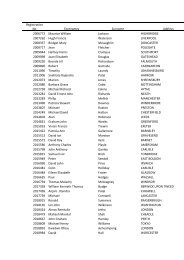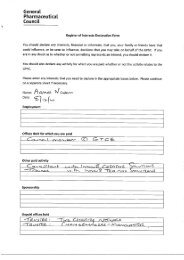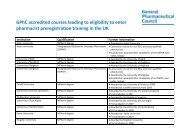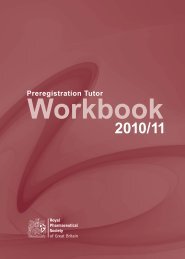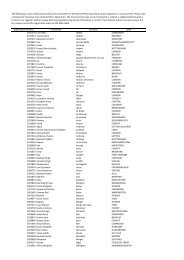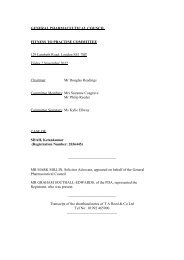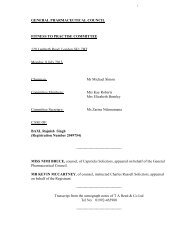Vora Snehlata Jayantilal 2017737 19-02-2013.pdf - General ...
Vora Snehlata Jayantilal 2017737 19-02-2013.pdf - General ...
Vora Snehlata Jayantilal 2017737 19-02-2013.pdf - General ...
Create successful ePaper yourself
Turn your PDF publications into a flip-book with our unique Google optimized e-Paper software.
1GENERAL PHARMACEUTICAL COUNCILFITNESS TO PRACTISE COMMITTEE129 Lambeth Road, London SE1 7BTThursday, 25 January 2013Chairman:Ms Siobhan GoodrichCommittee Members:Mr Adrian Barr-SmithDr Neil DoggettCommittee Secretary:Ms Georgia Conrad-LeighCASE OF:VORA, <strong>Snehlata</strong> <strong>Jayantilal</strong>(Registration Number <strong>2017737</strong>)DAY THREE-------------------------------------MR MARK MILLIN, Solicitor Advocate, appeared on behalf of the <strong>General</strong>Pharmaceutical Council.MR KEVIN MCCARTNEY, of counsel, instructed by Charles Russell LLP, appeared onbehalf of the Registrant, who was present.-------------------------------------Transcript from the stenograph notes of T A Reed & Co LtdTel No: 0<strong>19</strong>92-465900
2-------------------------------------DETERMINATION OF THE COMMITTEE ON FACTSTHE CHAIRMAN: Miss <strong>Vora</strong> was first registered as a pharmacist on 12 October <strong>19</strong>71.The allegation against Miss <strong>Vora</strong> is that her fitness to practise is impaired by reason ofmisconduct. There are some seven allegations against Miss <strong>Vora</strong>, all of which relate toalleged events on 13 and 14 July 2011. The allegation are as follows, starting fromparagraph 2:"2. On 13 July 2011 you refused to supply patient JR with all the medication thatshe had been prescribed by her GP and for which she had paid, namely:(i) you told patient JR that she first had to pay £2.99 for a compact make-upitem she had accidentally knocked over and broken, before you wouldsupply her medication;(ii) you removed one packet of patient JR's Clenil Modulite 100 medicationthat you had just dispensed from the bag;(iii) You told patient JR that you would keep one packet of patient JR'sClenil Modulite 100 medication until she paid £2.99 for the second brokencompact make-up item.3. Your conduct at 2 above was:(i) inappropriate, and/or(ii) contrary to Principle 1 of the Code of Ethics for Pharmacists andPharmacy Technicians.4. You refused to supply patient JR with her Clenil Modulite 100 medication untilshe paid a further £2.99 when she revisited the pharmacy on 14 July 2011, namely:(i) you refused to hand over to patient JR Clenil Modulite 100 medication;(ii) you told patient JR that you had added an outstanding balance of £2.99to her prescription charge;(iii) you agreed with patient JR that what you had done was illegal.5. Your conduct at 4 above was:(i) inappropriate, and/or(ii) Contrary to Principle 1 of the Code of Ethics for Pharmacists and
3Pharmacy technicians.6. You were abusive and aggressive and refused to listen to patient JR, namely:(i) you shouted at patient JR and her friend and said 'Get out of my shop,bitches' or words to that effect.7. Your conduct at 6 above was:(i) inappropriate, and/or(ii) contrary to Principle 1 of the Code of Ethics for Pharmacists andPharmacy Technicians, and/or(iii) contrary to Principle 3.2 of the Code of Ethics for Pharmacists andPharmacy Technicians.”Although the particulars of allegation refer to the Code of Ethics for Pharmacists andPharmacy Technicians, the principles before us are in fact contained in the Standards ofConduct Ethics and Performance published in September 2010. The principles said to beengaged are as follows:Principle 1:Principle 3:"Make patients your first concern. The care, well-being and safety of patients are atthe heart of professional practice. They must always be your first concern. Even ifyou do not have direct contact with patients, your decision or behaviour can stillaffect their care or safety.""Show respect for others. Showing respect for others is essential in forming andmaintaining professional relationships....3.2 Treat people politely and considerately."As has been rightly identified, the two key factual issues are: did Miss <strong>Vora</strong> retain a browninhaler that had been dispensed, and for which patient JR had paid? Did she say "Get outof my shop, you bitches", or words to that effect on 14 July, as alleged by patient JR andMrs McKenzie? There are other issues as well which we will have to determine, but this isthe core of the case.No admissions were made at the outset of the proceedings, although Miss <strong>Vora</strong> had set outin some detail the nature of her case: in her response dated 16 December 2011 to the letter
4written by Jacqueline Riley, a <strong>General</strong> Pharmaceutical Council investigator, dated 20November 2011; in her statement of case;and also in her witness statement which isundated but served in these proceedings and adopted in evidence before us.The allegations relate to events that took place on 13 and 14 July 2011. The evidence inrespect of the whole picture must be evaluated before any conclusions are reached. Havingconsidered the evidence as a whole, we will focus on each allegation separately.The burden of proof lies upon the Council to prove any disputed facts. The standard ofproof in these proceedings is the civil standard, i.e. the balance of probabilities. In thecontext of this case we have considered in Re B (Children) [2008] UKHL 35 and ReDoherty [2008] UKHL 33.In Re B Lord Hoffman said this:"Some confusion has been caused by dicta which suggests that the standard of proofmy very with the gravity of the misconduct alleged or even the seriousness of theconsequences for the person concerned."His conclusion was:"The time has come to say, once and for all, that there is only one civil standard ofproof and that is proof that the fact in issue more probably occurred than not."Both the decisions of their Lordships considered the judgment of Lord Nicholls in Re H(Minors) (Sexual Abuse: Standard of proof) [<strong>19</strong>96] AC 563, 586 D-H where his Lordshipsaid that:"The court will have in mind as a factor to whatever extent is appropriate in theparticular case that the more serious the allegation the less likely it is that the eventoccurred and, hence, the stronger should be the evidence before the court concludesthat the allegation is established on the balance of probability."We are guided by Lord Hoffman who said:"Common sense not law requires that, in deciding this question, regard should behad, to whatever extent appropriate, to inherent probabilities. If a child allegessexual abuse by a parent, it is common sense to start with the assumption that mostparents do not abuse their children. But this assumption may be swiftly dispelledby other compelling evidence of the relationship between parent and child and orparent and other children. It would be absurd to suggest that the Tribunal must inall cases assume that serious conduct is unlikely to have occurred. In many cases,the other evidence will show that it is all too likely."In Re D [2008] UKHL Lord Carswell said this:
5"In some contexts a Court or Tribunal has to look at the facts more critically ormore anxiously than in others before it can be satisfied to the requisite standard.The standard itself is, however, finite and unvarying. Situationswhich might make heightened examination necessary may be the inherentunlikelihood of the occurrence taking place (Lord Hoffman's example of the animalseen in Regents Park) the seriousness of the allegation to be proved or, in somecases, the consequences which could follow from acceptance ofproof of the relevant fact. The seriousness of the allegation requires no elaboration:A Tribunal of fact will look closely into the facts grounding an allegation of fraudbefore accepting that it has been established. The seriousness of consequences isanother facet of the same proposition: If it is alleged that a bank manager hascommitted a minor peculation, that could entail very serious consequences for hiscareer, so making it the less likely that he would risk doing such a thing. These areall matters of ordinaryexperience, requiring the application of good sense on thepart of those who have to decide such issues. They do not require a differentstandard of proof or a specially cogent standard of evidence, merely appropriatelycareful consideration by the Tribunal before it is satisfied of the matter which has tobe established."We apply these principles in this case.It is convenient to start with the background facts. Most of these appear to be commonground, or least not the subject of active challenge but, for the avoidance of doubt, weshould say that we find the following basic facts.At the time of the events in question, Mrs R was a long standing user of the Registrant'spharmacy. Indeed, her parents has used the pharmacy for many years, as did she after hermarriagewhen she needed to obtain medication prescribed for herself, her husband and herchildren. She used the pharmacy on a regular basis because she needed to use inhalers.She said (and we accept) that she saw herself as a loyal customer. Prior to the events inissue, she had had no cause for complaint about the services provided by Miss <strong>Vora</strong>. Therewas no background history, hostility or animosity between Mrs R and Miss <strong>Vora</strong>.It is common ground that, on 13 July 2011, Mrs R attended the pharmacy with NHSprescriptions for both herself and her husband. The items as prescribed by a doctor weredispensed by Miss <strong>Vora</strong>, and NHS prescription charges were paid by Mrs R as evidencedby the till receipt issued at 16.18 hours in the sum of £37.60. The medication prescribedand dispensed for Mrs R herself included two inhalers containing Ventolin, which arecoloured blue, and two inhalers containing Clenil Modulite, which are coloured brown.On Mrs R's evidence, just after the items had been dispensed and put into the bag and paidfor, a dispute arose. On Miss <strong>Vora</strong>'s evidence the dispute arose before the items wereplaced in the bag. The dispute concerned a basket of cosmetic compacts containingpressed face powder which was situated on the customer side of the counter, and this fell tothe floor. Miss <strong>Vora</strong>'s perception was that this was Mrs R's fault, and was caused by heradjusting her scarf or pashmina. It is at least common ground that some damage was
6caused, although the extent of any damage and the number of compacts involved, and howmany compacts Mrs R left with, have all been the subject of detailed cross-examination.In very broad summary, on Miss <strong>Vora</strong>'s case, she asked Mrs R to pay for damage caused toa number of compacts. Mrs R's evidence was that she saw that the compacts were priced at£2.99 and offered to pay £3. It is common ground that Mrs R did pay £3, although theattitude with which this was paid is a matter of dispute.In our view the true gravamen of the allegations with which we are concerned relate toMiss <strong>Vora</strong>'s alleged response to the failure to reach an agreement concerning payment fordamaged items that were satisfactory to her.Mrs R's evidence was that, because of the dispute about payment for the damage to thecompacts, Miss <strong>Vora</strong> removed one packet of the Clenil Modulite medication that she hadjust dispensed from the bag in front of her. In her complaint form dated 14 July, which, asevidenced by the date stamp, was received by the Fitness to Practise Directorate of the<strong>General</strong> Pharmaceutical Council on 18 July 2011, she said that Miss <strong>Vora</strong> said to her thatshe would keep one pack of the brown inhaler (i.e. Clenil Modulite) until she (Mrs R) paid£2.99 for a second broken compact. If Mrs R's evidence is credible or reliable, this was adeliberate decision and a deliberate act.Miss <strong>Vora</strong>'s evidence was that damage had in fact been caused to five compacts. She had asign in her shop which said that all breakages must be paid for. It was clear to her that MrsR would not pay more than £3 that had been described by Mrs R as a goodwill gesture, andshe says that she was deeply offended by the manner in which the offer was made. Sheclaims that the £3 was thrown down, and she felt insulted and humiliated. In her mind sheconsidered that the cost of the damage, without making any sale profit, was £15. Herevidence was to the effect that she asked Mrs R politely if she would mind if she withheldone item from the dispensed medication. What she had in mind, on her evidence, was thatMrs R would have to return to the shop where the matter would somehow be resolved.If the attitude of Mrs R was as described by Miss <strong>Vora</strong>, it is not quite clear to us what shethought would be achieved in any such negotiation on a later date. Be that as it may, theeffect of Miss <strong>Vora</strong>'s evidence is that she wanted to, and had asked, if she could retain aprescribed and dispensed medication for which the customer had paid pending resolutionof a dispute, but she did not as a matter of fact do so. Miss <strong>Vora</strong> emphatically denies thatshe retained one of the dispensed brown inhalers. So far as she was concerned, Mrs R leftthe pharmacy with all the medication prescribed and dispensed.In contrast, Mrs R's evidence was that Miss <strong>Vora</strong> removed one brown inhaler from the bagin which the medication had already been placed and for which she had paid. She hadargued with Miss <strong>Vora</strong> that she had paid for the medicines and they were hers. Mrs R'swas that she said to Miss <strong>Vora</strong> that she could not remove her medication, but Miss <strong>Vora</strong>said to her that she could. Mrs R left the pharmacy and returned to work where she spoketo colleagues, R about what had happened, one of whom was Mrs McKenzie who wascalled to give evidence about what she observed on 14 July. Mrs R also said in evidence
7that she was so shocked to have been treated in this way that she phoned the GP surgery foradvice. There was some exploration in cross-examination as to whether Mrs R spoke to aGP or receptionist, but suffice to say we accept that, soon after leaving the pharmacy, MrsR sought advice from the GP surgery and was told that the prescribed medication shouldnot have been withheld.Whether there was, as a matter of fact,any later contact between Mrs R and Miss <strong>Vora</strong> on13 July is a matter of dispute. It is however at least common ground that Mrs R's husbandtelephoned Miss <strong>Vora</strong> that evening, although the number of calls and what was then said isnot agreed. Mrs R claims that she was present when these phone calls were made, but wehave not heard evidence from Mr R. In due course we will consider Miss <strong>Vora</strong>'s accountsof her conversation with Mr R. It is perhaps sufficient to say at this stage that Mrs R wasnot satisfied with Miss <strong>Vora</strong>'s response to the further representations made by her husband.Mrs R also telephoned the <strong>General</strong> Pharmaceutical Council on the morning of 14 July andwas advised to revisit the pharmacy to see if Miss<strong>Vora</strong> would give her the prescribedmedication withheld.It is common ground that Mrs R went back to the shop on 14 July with her work colleagueMrs McKenzie as a witness. We noted Mrs McKenzie's evidence that Mrs R asked hercolleagues if somebody would accompany her. Mrs McKenzie volunteered as she was freeto do so. Mrs R's evidence was to the effect that she tried to have a civil conversation withMiss <strong>Vora</strong> and asked for her outstanding prescription item, but Miss <strong>Vora</strong> resolutelyrefused until she paid an outstanding balance of £2.99, i.e. further to the £3 tendered.In her complaint to the <strong>General</strong> Pharmaceutical Council, which we find as a fact waswritten on 14 July 2011, she said this:"She went on to say that she had now placed an outstanding balance of £2.99 on myprescription charge and I could not have the item until I paid this amount. Iexplained to her that when I paid £37.60 by credit card yesterday, this was the fullamount payable for all the items on my prescription, so I had no outstandingbalance. She was again abusive and aggressive, she refused to listen to anything Ihad to say, and was shouting and raising her voice at me over the counter. At thispoint I realised that I was fighting a losing battle and she had left me with no optionother than to make a formal complaint to the <strong>General</strong> Pharmaceutical Council.Once again she refused point blank to give me the item in questions and thenshouted at my colleague and I 'Get out of shop, bitches'. Up to this point mycolleague had been just standing next to me and not engaged in any conversationwith her. I pointed out once again that what she was doing was illegal, and shestated that 'Yes it is, but I want that money back'.I cannot believe that a dispensing chemist would behave and act in this. My pointto her was would she have done the same thing to an elderly person or maybe ayoung mother who would not have been able to afford to pay for the damages? Theprinciple I wish to make is that she does not have the right to play God when itcomes to withholding prescription items. I see that the damage to the shop goods is
8a separate incident and nothing to do with keeping back the prescription item inquestion. My colleague did try to explain this to her but to no avail."Miss <strong>Vora</strong>'s essential case may be summarised in her response to the allegations put by<strong>General</strong> Pharmaceutical Council investigator Miss Riley on 20 November 2011. Theallegations were then framed as follows:"1. That on 13 July 2011 you selected Clenil Modulite 100 from a bag of itemswhich had been dispensed against an FP10. These items had been paid for by thepatient totaling £27.60. You refused to hand this item to the patient Mrs R until shehad paid you an additional £5.89 in consideration of breakages which had beenmade in your pharmacy during the transaction.2. That on 14 July you became abusive when Mrs R returned with a witness tocollect the outstanding dispensed item. Despite Mrs R having paid you £2.99 in agesture of goodwill, you demanded a further sum of £2.99 and, when she refused,you shouted 'Get out of my shop, bitches'."In response to that allegation, Miss <strong>Vora</strong> said this in a letter dated 16 December 2011which we have anonymised:"Concerning the allegations raised by Mrs R, the facts of the matter are that I have anotice in my pharmacy stating that all breakages must be paid for. On July 13 MrsR attended the pharmacy to collect her prescription and I believe she knocked offthe counter a basket of goods which resulted in some items being damaged. I askedher to pay for the damages in the sum of £5.98 which she refused to do. As I recall,Mrs R did make a small contribution to the cost of the damages, and I placed theitems in a bag with her dispensing and she left the shop. I did not however refuseto give her medicines.Mrs R returned to the pharmacy asking for some more medication which shebelieved was owing to her. However, I had already dispensed all that was due toher. As she did not accept this I recall that she did become aggressive towards me.However please be assured that I did not shout to her, or say to her and/or herfriend, 'Get out of my shop, bitches'.I apologise for having upset Mrs R and should you wish to discuss the matterfurther please do not hesitate to contact me."It is common ground that Miss <strong>Vora</strong>, in her written statement and in her evidence beforeus, accepted that both Mrs McKenzie and Mrs R did visit the shop on 14 July. Herevidence is that they were both shouting at her and so she could not give much detail as towhat was said. She has never used the word 'bitches' in her life as this is not how she wasbrought up.Miss Valand was a counter assistant who was present in the shop on 14 July when Mrs R
9and Mrs McKenzie attended, and who now lives in a remote and rural location in Zambia.It was the Registrant's position that it was a disproportionate expense to hear her evidenceby video link, and which could only be organised if she travelled to Lusaka some 12 hoursdistant. In these circumstances it was directed that efforts would be made to receive herevidence by Skype at the offices of Miss <strong>Vora</strong>'s solicitor, but the connection did notsucceed. We heard her evidence via the telephone, as this seemed the next best possiblemethod in all the circumstances.We noted from the e-mail correspondence before us that the request made by Miss <strong>Vora</strong> at8.27 am on 17 April to Miss Valand set out Miss <strong>Vora</strong>'s short version of events. We notedalso the further e-mail sent by Miss <strong>Vora</strong> at 8.58 on 18 April. In this she said:"Thank you for confirming I am innocent. My solicitor asked me if you would mindif I forwarded the e-mail to her. I think she needs you to confirm this matter. Yes itwas Mrs R and her friend, you have very good memory. I clearly remember tellingher that I put everything in the bag, including all the medicines and all the brokenpowder refills. As you know they were not prepared to listen and kept going on andon, and the shouting from both of them got louder and louder."At 10.11 am on 18 April 2012, Miss Valand replied:"Hi Miss <strong>Vora</strong>, Yes I also remember you telling her that you had put the medicineand the powder refills that she had broken all in her bag, but they kept still shoutingall sorts."We do not in this determination set out the longer e-mail and response. They are exhibitsin the case and can be considered Viewed as a whole, the e-mails strongly suggest that thewitness Miss Valand was content to adopt that which had been set out by Miss <strong>Vora</strong> in here-mail with little qualification. The eventual formal statement obtained by the Registrant'ssolicitor, Miss Honeyball, was short and to the point and along the same lines as the e-mailcommunication. Inevitably this raised the question as to how much of Miss Valand'sstatement was prompted by the e-mail sent and how much was her own recollection.The overall effect of Miss Valand's oral evidence was that, when Mrs R and MrsMcKenzie attended the shop on 14 July, they stood near to the door and both shouted forabout five minutes. Miss <strong>Vora</strong> was unable to describe what was said in any detail but,when asked questions by the Committee was able to recall some matters, that did notappear in her e-mails or statement, which suggested to us that she did have some realmemory. By way of example she did recall that what was being said by the two womenwas that medication had been withheld. She also recalled that one of the women had leftthe premises before the other.In cross-examination Miss Valand said that she could not remember Miss <strong>Vora</strong> using theword 'bitches'. In answer to Mr Millin, the effect of her evidence was that she agreed that itwas fair to say that this word may have been used; she could not remember it. Inre-examination, she said that, if the word had been used, she would have remembered it.
10The challenge to Mrs R's evidence has been on the basis that her evidence is not credible.Mr McCartney explained that the he uses the word 'credibility' to cover a number ofsituations, including where the witness has an honest belief but what is said is notinherently credible; where the witness is not telling the truth (in short he is telling lies); orwhere the witness is mistaken.In the course of the hearing, it became apparent that there were disputes of differences ofrecollection about the number of compacts that fell on the floor; how many were in fact (oras a matter of opinion) damaged; how many compacts were handed to Mrs R by Miss<strong>Vora</strong>.Mr McCartney highlighted a number of inconsistencies in the evidence in this regardin support of his submission that the evidence of Mrs R was not credible or reliable.Although Mrs R said in cross-examination that she had shown two compacts to Miss Riley,the Council accept, in the light of the inquiries made of Miss Riley, that it is unlikely thatshe did so. It follows that that evidence of Mrs R in this regard is incorrect. The Councilalso accept that Miss Riley would never have said that the compacts would not form part ofthe evidence. It follows that Mrs R's evidence in this regard is incorrect.Of course, when a witness answers a question with apparent conviction, but which she thenretracts when asked further questions, or which is then contradicted by other evidence, thiscauses any decision-maker considerable pause for thought. It is true that Mrs R was awitness who expressed herself in a manner that suggested that she had no doubt, until herevidence was explored. The prime example of this was when she was cross-examined byMr McCartney as to whether she had spoken to Miss <strong>Vora</strong> on the telephone on the eveningof 13 July. In summary, she moved from certainty that she had not, to indecision that shemay have, and to a degree of belief that she must have. In our view, the explanation is thatshe genuinely did not remember the telephone conversation on 13 July when giving herevidence before us.Do we believe Mrs R's evidence that one brown inhaler was removed from the bag ofitems dispensed and paid for? If it was not, it would follow that Mrs R had that item aftershe left the pharmacy but nonetheless returned to work and spoke to her colleagues aboutthe incident; phoned her GP surgery; was present when her husband telephoned Miss <strong>Vora</strong>concerning the removal of the items; phoned the <strong>General</strong> Pharmaceutical Council to makea complaint about the removal of the item; reattended the pharmacy with a witness the nextday to request the return of the item; made a complaint in writing to the <strong>General</strong>Pharmaceutical Council on 14 July 2011; made a statement to Miss Riley on 1 August2011; attended to give evidence in these proceedings - even though at all material timesshe had had the item said to have been withheld in her possession.Whilst we accept that at times Mrs R's evidence was inconsistent on some aspects, weconsider it likely that this reflected the fact that she did not think that such matters wereimportant. What shined through her evidence as a whole is that for Mrs R what wasimportant was that no matter why the compacts had fallen, how many had fallen, howmany had been handed to her, where she was in relation to the counter, etc, etc, paled intoinsignificance in relation to what she saw as the central issue: was it right that Miss <strong>Vora</strong>had retained her medication in the context of the dispute?
11The issue is whether the confidence with which Mrs R expressed herself in relation to thecentral issues is in fact well founded. There was no exploration of the possibility that MrsR had made a mistake, i.e that at all times in July 2011 had had the item, but we havenonetheless considered this. We do agree that some aspects of Mrs R's evidence wereinconsistent. To take one example, she clearly said on two occasions in cross-examinationthat she had not spoken to Miss <strong>Vora</strong> on the telephone later on 14 July. When taken to herrecord made, dated 14 July, she had difficulty explaining why she had said therein that shespoke to Miss <strong>Vora</strong> on the telephone. In the event that she said she could not nowremember if she had spoken to Miss <strong>Vora</strong>. We find that based on her own nearcontemporaneous record, she must have been done so. Common sense and experience tellus that the memory can play tricks. We do not consider that this, or any other of theinconsistencies on which reliance was placed, materially undermined the core of Mrs R'saccount.If Miss <strong>Vora</strong>'s evidence is reliable, she asked Mrs R if she would mind if she removed oneitem but, in the event, did not do so because Mrs R would not agree. In our view, it isimprobable that Miss <strong>Vora</strong> on her own admission would think to do the very thing that sheis accused of doing, but draw back at the request of Mrs R. It is plain to us that shestrongly felt that she had a claim of right to withhold prescribed medication.A great deal of emphasis has been placed by her upon the sign Ms <strong>Vora</strong> claims wasexhibited on the counter. If the sign was present on that day - and we make no finding asto this - it simply illustrates Miss <strong>Vora</strong>'s attitude to commercial relations with hercustomers. We have no doubt that Mrs R did not see it and, in our view, its present orabsence has no material bearing on the core facts.There were several aspects of Miss <strong>Vora</strong>'s evidence that we considered to be unsatisfactory.We highlight some of these, some of which are more or less important than others. Herevidence was to the effect that, in her own mind, she estimated the damage to the compactsto be £15, but this was the cost price rather than the sale price. She was unable to say atwhat price the compacts were on sale. Mrs R's evidence was that the price label was £2.99.If she is right on this, then £15 would roughly equate to five compacts at £2.99.Miss <strong>Vora</strong> explained this by saying that this was the price of the refills. We have hadconsiderable doubt that this damage analysis was in fact undertaken by Miss <strong>Vora</strong>, either inher mind or otherwise. Whether it was or not, we accept that the request for paymentrelated to an additional £2.99 further to the £3 already given by Mrs R.Miss <strong>Vora</strong>'s evidence about the telephone calls is in our view significant. Her broad casewas that, because Mr R phoned when she was busy dispensing, she had asked if she couldring him back after work. On her evidence Mr R carried on saying exactly what Mrs R wassaying. Mr R was saying that she (Miss <strong>Vora</strong>) had not given Mrs R one of the items. Miss<strong>Vora</strong> said this in evidence that she said to Mr R: "I will tell you the whole story, whathappened, when I have finished work." On her evidence, the conversation with Mr R wasof one or two sentences, and she said "It lasted a couple of minutes - no, not even a
12minute". Her account is that Mr R rang on two or three occasions, and she said, "I will talkto you after I have finished". She was in the middle of dispensing, and the calls weredistracting her.Miss <strong>Vora</strong> added that Mr R can be very persevering in this sort of matter because she haddealt with him before and knew what he was like. "He can keep on and on until he gets ananswer. He will not wait for an answer; he is very impatient". In her witness statementMiss <strong>Vora</strong> said that she wanted to ring back to explain the situation, and wanted them tocheck the bag as she was sure that all the medication was in it. When she phoned at 8 pmshe could not get through.Given Miss <strong>Vora</strong>'s account of the two or three calls made by the persistent Mr R, and ifher true state of mind was that she had not retained the brown inhaler, it is in our view verysurprising that she did not simply say "Please ask your wife to check the bag because I amcertain that all the items dispensed were in it.". It would have taken less than ten secondsto do so.The matters do not end there because Mrs R, accompanied by Mrs McKenzie, visited thepharmacy on 14 July. If their evidence is true, it was made clear to Miss <strong>Vora</strong> on morethan one occasion that Mrs R was, to say the least, most unhappy that an item of hermedication had been withheld. It would have been all too easy to say "You are wrong. Allthe items were put in the bag". Mr McCartney places emphasis on the evidence of MissValand. Her evidence was that she remembered Mrs R asking for the inhaler and Miss<strong>Vora</strong> saying that she had put it all in the bag. This account is one that Miss <strong>Vora</strong> had,however, set out in the e-mail to Miss Valand on 17 April 2012, and the subsequent e-mail.Although we accept that Miss Valand in her evidence did demonstrate in answers toquestions from the Committee that she did have some recollection of matters that had notbeen included in her original e-mails sent to Miss <strong>Vora</strong> or in the statement provided toMrs Honeyball, we consider that the reliance that can be placed upon this aspect of MissValand's evidence to have been significantly undermined by the fact that Miss <strong>Vora</strong> hadeffectively set out her case as to the alleged facts in the e-mail dated 18 April.The other matter of some importance is whether anything was said at all about Mrs R being“rich and able to afford it.” Mrs McKenzie's evidence was that, after Mrs R left thepharmacy on 14 July, she (Mrs McKenzie) had tried to explain to Miss <strong>Vora</strong> that therewere two separate matters. If Mrs R owed her money for breakages, that was separate tothe dispensed item.We ask ourselves this question: why would Mrs McKenzie say this to Miss <strong>Vora</strong> unless itwas clear to her that Miss <strong>Vora</strong>'s attitude was that she was entitled to retain the inhaler?The matter goes further: the alleged response "She can afford it, she is rich", if in thecontext described by Mrs McKenzie is accurate, indicates a certain attitude towards Mrs R.Miss <strong>Vora</strong>'s explanation is that she only said something to this effect by way of explanationto the counter assistant Miss Valand. She said this at page 100 of the transcript: "I was
13only telling Betsy that she could not afford it, because she said she is not rich to pay themoney, she did not have enough money on her. She said she has not got any money in thepocket". We do not believe that, in the context of the exchange on 14 July, Miss <strong>Vora</strong>would have been taking the time to provide an explanation to Betsy Valand in the presenceof Mrs McKenzie or that the latter misunderstood. Why would Mrs McKenzie make thepoint, (as we accept she did) to Miss <strong>Vora</strong> that these were separate matters, and also makethe point that Miss <strong>Vora</strong>'s attitude left Mrs R with no option but to make a complaint to the<strong>General</strong> Pharmaceutical Council. We consider it most unlikely that this would haveoccurred if Miss <strong>Vora</strong> had provided any explanation to contradict the assertion that she hadwrongly retained dispensed medication.Another aspect of Miss <strong>Vora</strong>'s evidence that was troubling was her assertion made, that on13 July she had shouted, as Mrs R went out of the door, "I have put everything in yourbag". Miss <strong>Vora</strong> also said that Mrs R asked her from the door "'Have I got everything?', andI said 'Yes you have', just loud enough so she could hear her.” This evidence, given on anumber of occasions, had every appearance of being an afterthought.Miss <strong>Vora</strong>'s evidence was also confused concerning her denial that she had acknowledgedto Mrs R on 14 July that it was wrong to retain medication. She said - and this is at page108 of the transcript: "I did not know it was illegal", and said this had never even crossedher mind. But shortly afterwards at page 109 she said, "I asked her if I could retain it. Iasked her permission because we are not allowed to keep medication when it is authorisedofficially by the doctors".Having considered all of the evidence in the round, we accept the evidence of Mrs R andMrs McKenzie. We do not believe Miss <strong>Vora</strong>'s account in relation to the disputed issues.We simply do not credit that Mrs R has or had any reason or motive to complain aboutMiss <strong>Vora</strong> unless she was confident about what had happened, and unless events shedescribes had occurred. We considered, but rejected as highly improbable, the faintsuggestion made that Mrs R had been given the inhaler but did not know that she had it inher possession. We do not consider it necessary to make a finding as to how manycompacts were damaged. It is clear on the evidence that some compacts were given to MrsR and that she took them away. Whether it was two (as per Mrs R's evidence) or five (asper Miss <strong>Vora</strong>'s evidence) really matters not. Whether Miss Riley was or was not shownone or more compacts is not in our view a factor that casts any significant doubt upon thecredibility and/or reliability of Mrs R's core account.We accept that on 13 July Miss <strong>Vora</strong>'s attitude was that the item was to be withheldpending the payment of a further £2.99. We find that Miss <strong>Vora</strong> took out one browninhaler from the bag because of the dispute about the amount of damages to be paid. Wefind that she acknowledged the very next day that she knew that this was wrong, but sherefused to return the item.We now turn to consider the evidence in more detail in respect of the allegation that Miss<strong>Vora</strong> said to Mrs R and Mrs McKenzie "Get out of my shop, you bitches". MrsMcKenzie's evidence was that she heard Miss <strong>Vora</strong> say words to this effect. She said that
14she was one hundred per cent sure the words were spoken clearly and quite loud. Awitness who expresses one hundred per cent certainty may leave themselves open tocriticism and indeed some doubt. However, having seen and heard Mrs McKenzie, weconsider it highly unlikely that she would have come to this tribunal to give such evidenceunless she was confident that these were the words that had been said. Mrs McKenzie wasa very impressive witness in all respects. She came across as somebody whose evidencewas unswayed by emotion, untouched by anger, and who was very careful to admit thatwhich she could not remember. We accept her account of the events of 14 July in allrespects.Having considered all of the representations made, and all of the evidence, we makefindings as follows:Paragraph 2:(i) unnecessary; our findings adequately reflected in our determination above, and in (ii)and (iii) in any event.(ii) proved;(iii) proved.Paragraph 3:(i) proved.(ii) proved.Paragraph 4 (i), (ii) and (iii) proved.Paragraph 5(i) and (ii) proved.Paragraph 6(i) proved.Paragraph 7 (i), (ii) and (iii) proved.That concludes the determination of the Committee------------------------------GENERAL PHARMACEUTICAL COUNCIL
15FITNESS TO PRACTISE COMMITTEE129 Lambeth Road, London SE1 7BTTuesday, <strong>19</strong> February 2013Chairman:Committee Members:Ms Siobhan GoodrichMr Adrian Barr-SmithDr Neil DoggettCommittee Secretary:Ms Georgia Conrad-LeighCASE OF:VORA, <strong>Snehlata</strong> <strong>Jayantilal</strong>(Registration Number <strong>2017737</strong>)DAY FOUR-------------------------------------MR MARK MILLIN, solicitor advocate, appeared on behalf of the <strong>General</strong>Pharmaceutical Council.MR KEVIN MCCARTNEY, of counsel, instructed by Charles Russell LLP, appeared onbehalf of the Registrant, who was present.-------------------------------------Transcript from the stenograph notes of T A Reed & Co LtdTel No: 0<strong>19</strong>92-465900-------------------------------------
16DETERMINATION OF THE COMMITTEE ON IMPAIRMENT OF FITNESS TOPRACTISETHE CHAIRMAN: The Committee has considered the parties' submissions in relation towhether the Registrant's fitness to practice is impaired by reason of the misconduct provedagainst her.We refer to our findings of fact which we will now summarise.On 13 July 2011 Mrs R, a long standing customer, attended Miss <strong>Vora</strong>'s pharmacy with anNHS prescription for a number of items that were duly dispensed. After the items had beenplaced in a bag and paid for, Mrs R accidentally knocked a basket of powder compactsfrom the counter to the floor causing some to break. Miss <strong>Vora</strong> sought payment of £5.98for the damage but Mrs R would only pay £3. Miss <strong>Vora</strong> then removed one of thedispensed items, a Clenil Modulite inhaler, from the bag on account of the further sum thatshe required. Mrs R remonstrated with Miss<strong>Vora</strong> but to no avail.Such was Mrs R's upset at what had happened that, amongst other matters, she phoned herGP for advice. Her husband telephoned Miss <strong>Vora</strong> to complain that evening. On 14 JulyMrs R spoke to the <strong>General</strong> Pharmaceutical Council.Mrs R was advised by the <strong>General</strong> Pharmaceutical Council to return to the pharmacy andrequest that the withheld medication be returned to her. She did so on 14 July,accompanied by a work colleague, Mrs McKenzie. Miss <strong>Vora</strong> said that she had nowplaced an outstanding balance of £2.99 on the prescription charge and Mrs R could not
17have the item until she paid this amount. Miss <strong>Vora</strong> acknowledged to Mrs R that what shehad done was illegal, but refused to return the medication until the outstanding sum waspaid. She was abusive and aggressive and refused to listen to reason, even though it wasmade clear that Mrs R would proceed to complain to <strong>General</strong> Pharmaceutical Council. Thematter culminated in Miss <strong>Vora</strong> shouting 'Get out of my shop, you bitches'. Despite thisabuse, Mrs McKenzie remained behind. Miss <strong>Vora</strong> made a comment that Mrs R “canafford it, she is rich”. Mrs McKenzie attempted to reason with Miss <strong>Vora</strong> by pointing outthat the prescribed medicine was a different issue to that of the damage to goods and, evenmore crucially, that her attitude left Mrs R with no option but to make a complaint to the<strong>General</strong> Pharmaceutical Council. Such reasoning was to no avail.Later that day Mrs R duly made her complaint to the <strong>General</strong> Pharmaceutical Council inwriting.The terms in which Mrs R wrote are worth examination because they illuminatesome of the public interest issues involved. She said this on the very same day:"I cannot believe that a dispensing chemist would behave and act in this way. Mypoint to her was would she have done the same thing to an elderly person or maybea young mother who would not have been able to afford to pay for the damages?The principle I wish to make is that she does not have the right to play God when itcomes to withholding prescription items. I see that the damage to the shop goods isa separate incident and nothing to do with keeping back the prescription item inquestion. My colleague did try to explain this to her but to no avail."Ms <strong>Vora</strong> has resolutely denied that the events had occurred as described by Mrs R and MrsMcKenzie. However this may have been addressed in submissions made prior to ourfindings of fact, the main issue in this case was who was telling the truth. We did notbelieve Miss <strong>Vora</strong>'s account.
18Against this background we now examine whether Miss <strong>Vora</strong>'s fitness to practice isimpaired by reason of the proven misconduct. It is notable that it is disputed that this is so.Mr McCartney submits that the fact that the allegations were denied should not, of itself,lead to a finding of impairment. It is a matter that is relevant to our assessment of Miss<strong>Vora</strong>'s insight. We entirely agree.Mr McCartney further submitted that the Committee may feel that the Registrant held abelief that she was entitled to be reimbursed for the damage caused and this provides somecontext to the circumstances. It means that the question of insight is less profound than itmight otherwise be. The conduct committed some time ago was not sufficiently egregiousto warrant a finding of impairment. This was not a situation where the patient was leftwithout her medication as there was another Clenil Modulite inhaler in the bag. There hasto be a sense of proportion applied when someone is dealing with members of the public.There was no immediate risk to the patient. The conduct was not sufficiently egregious towarrant a finding of impairment in order to protect public confidence in the profession andso as to declare and maintain proper standards.It is worth recallingto mind the principles of the Standards of Conduct, Ethics andPerformance published by the Council in September 2010. The principles that we havefound were repeatedly broken by Miss <strong>Vora</strong> on 13 and 14 July were as follows:Principle 1:"Make patients your first concern. The care, well-being and safety of patients areat the heart of professional practice. They must always be your first concern. Evenif you do not have direct contact with patients, your decision or behaviour can still
<strong>19</strong>affect their care or safety."Principle 3:"Show respect for others. Showing respect for others is essential in forming andmaintaining professional relationships....3.2 Treat people politely and considerately."We are entirely satisfied that the findings we have made amount to misconduct. It issuggested that the misconduct was not so serious as to justify a finding of impairment. Wedisagree. Doubtless there will be occasions when a pharmacist might, for whatever reason,momentarily lose sight of the need to behave professionally. Here the matters went far farbeyond that. Miss <strong>Vora</strong> made a deliberate decision to withhold an item of medicationprescribed by a doctor and paid for by the patient because she placed her commercialinterests above the ethics of her profession. In our view this alone amounts to seriousmisconduct. The matter goes further than this because, despite the intervention of Mrs R'shusband, and although given the opportunity to reflect overnight and retreat the next day,Miss <strong>Vora</strong> resolutely maintained her position and refused to give the medication back toMrs R even though she knew that what she was doing was wrong. In short, she wanted hermoney. Her persistent refusal was even in the knowledge that the patient would complainto the <strong>General</strong> Pharmaceutical Council. In addition, she was abusive and aggressive.We have considered the examples given by Lady Justice Smith in the Shipman InquiryReport as to why a decision-maker might conclude that fitness to practice is impaired (see
20the judgement in Cheatle v GMC [2009] EWHC 645 (Admin) at paragraph 17). We referto our findings. We consider that Miss <strong>Vora</strong> has, by reason of her misconduct on 13 and14 July 2011, brought the pharmacy profession into disrepute. She also breachedfundamental tenets of the profession. Her patient was not her first concern. She withheldprescribed medication in order to force a customer to pay compensation, and was extremelyrude and abusive to a patient and another member of the public.We turn to consider the issue of insight. Miss <strong>Vora</strong> did accept that if she had withheldmedication it would be obvious that she had not taken care of her patient’s well-being. Sheacknowledged that it was very important that a patient is given all their medication. Thesepoints are so basic they could hardly be denied. Miss <strong>Vora</strong>'s evidence was that she hadsimply not acted as alleged. Miss <strong>Vora</strong> was, of course, entitled to deny the allegationsvigorously and, by her counsel, to cross-examine the witnesses. We acknowledge thatacceptance of culpability is not a condition precedent of insight. Further, it is no part ofour function to punish Miss <strong>Vora</strong> because we have found that she did not tell us the truth.It is, however, our function to assess Miss <strong>Vora</strong>'s fitness to practice in the context of thepublic interests engaged, and this involves consideration of her insight into the gravity ofthe matters in issue and her insight as to the standards of behavior required by members ofthe profession of pharmacy. The fact is that, when Miss <strong>Vora</strong> removed the ClenilModulate inhaler on 13 July 2011 in order to compel Mrs R to return and pay the sum sherequired, she showed no insight. When she refused to listen to reason on 13 and 14 July2011, she showed no insight. In shouting abuse at Mrs R and Mrs McKenzie, even whenshe knew that a complaint might well be made, she showed no insight. Given her trenchantdenial of the facts as we have found them to be, it is indeed difficult to say that Miss <strong>Vora</strong>has any real insight today.There has been no remediation. In the absence of any real insight, and given the extreme
21attitude displayed by Miss <strong>Vora</strong> in the past, we consider that the risk of recurrence of adeparture from proper standards is significant.Mr McCartney submits that Miss <strong>Vora</strong>'s conduct was not egregious. We disagree. Leavingaside the issue of insight and risk of recurrence, we consider that this is, in any event, acase where the need to declare and maintain the requirement for adherence to theobligation to provide any medicine duly prescribed by a doctor, as well as adherence tohigh standards of conduct towards patients, requires that a finding of impairment is madeso as to maintain public confidence in the profession.We are satisfied that Miss <strong>Vora</strong>'s misconduct in respect of the proven allegations wasserious and that her fitness to practice is impaired by reason of such misconduct.We proceed to the next stage and we will hear submissions on sanction.--------------------------
22GENERAL PHARMACEUTICAL COUNCILFITNESS TO PRACTISE COMMITTEE129 Lambeth Road, London SE1 7BTTuesday, <strong>19</strong> February 2013Chairman:Committee Members:Committee Secretary:Ms Siobhan GoodrichMr Adrian Barr-SmithDr Neil DoggettMs Georgia Conrad-LeighCASE OF:VORA, <strong>Snehlata</strong> <strong>Jayantilal</strong>(Registration Number <strong>2017737</strong>)DAY FOUR-------------------------------------MR MARK MILLIN, solicitor advocate, appeared on behalf of the <strong>General</strong>Pharmaceutical Council.MR KEVIN MCCARTNEY, of counsel, instructed by Charles Russell LLP, appeared onbehalf of the Registrant, who was present.-------------------------------------Transcript from the stenograph notes of T A Reed & Co LtdTel No: 0<strong>19</strong>92-465900-------------------------------------
23DETERMINATION OF THE COMMITTEE ON SANCTIONThe committee has considered the issue of sanction.It is not our function to punish Miss <strong>Vora</strong> but to protect the public interest. In this case weconsider that the aspects of the public interest engaged are the declaration and maintenanceof proper standards or professional behaviour, and the maintenance of public confidence inthe profession of pharmacy.At this stage of the proceedings we have been provided with material concerning Miss<strong>Vora</strong>'s previous history. In some 40 years of practice she has never before appeared beforeher professional body. Between September 2009 and March 2010 a number of complaintswere made by four separate patients and an inspection undertaken also raised some issuesof concern. In the event, the matters were referred to the Investigating Committee whoconsidered a wide range of allegations which included refusing to provide Patient ZL witha patient information sheet; acting in an unprofessional manner towards Patient NM (whowas suffering from swine flu and had attended for Tamiflu) by shouting at her to get out ofthe pharmacy; refusing to provide a receipt for patient AB; failing to ensure that a memberof her staff had undergone a accredited training course; allowing the disposal of patientidentifiable information in a manner that did not preserve confidentiality; failing to keeppatient returned medication segregated from stock; instructing someone working in thepharmacy to sort through patient returned medication with a view to reusing it.We have seen the witness statements which describe in some considerable detail thealleged attitude and demeanour of Miss <strong>Vora</strong> in relation to the complaints where a disputewith a patient was alleged.
24None of these matters alleged were accepted by Miss <strong>Vora</strong> and she made writtenrepresentations which were considered by the Investigating Committee on 23 February2011. In its decision, which was sent to Miss <strong>Vora</strong>, the Investigating Committee noted thatthe allegations covered a number of separate incidents, but together indicated a pattern ofpersistent behaviour towards the public. The Investigating Committee's view was that itwould be appropriate to dispose of the matter by way of a warning subject to anyrepresentations by Miss <strong>Vora</strong>.In her response on 23 March 2011 Ms <strong>Vora</strong> reiterated that she denied the allegations. Sheattributed the complaints to allegations being made by difficult people or people in adifficult emotional state. She submitted that no further action should be taken but, failingthis, she would rather have a warning than that the matters be referred to the Fitness toPractice Committee.On 29 March 2011 the Investigating Committee issued a warning which was non-specific.In the context of the draft Particulars of Allegation that had been provided, as well as allthe statements of the patients, it should have been clear to Miss <strong>Vora</strong> that any futuredeparture from standards, particularly in relation to her dealings with customers, was to beavoided.Miss <strong>Vora</strong> relies on a large number of testimonials from patients which speak in glowingterms of her professionalism, dedication, kindness, helpfulness and willingness to go theextra mile. These provide a significant contrast to the allegations made in the Council’sprevious history bundle. It is plain that there are many in the community she serves whohold Miss <strong>Vora</strong> in high regard and who would regard any restriction on her ability topractice as a loss to the community. It has to be said that many of the references were
25written on the basis that Miss <strong>Vora</strong> had not acted in the way that we have found proven butthis, of itself, does not detract from the overall impact of the references as a whole.It is common ground that we are entitled to consider and weigh all the information beforeus in determining the appropriate and proportionate sanction required in the public interest.We have considered very carefully all the submissions that have been ably made by MrMcCartney, as well as all the testimonial evidence. He places emphasis upon the 40 yearsof service provided by Miss <strong>Vora</strong> as an independent. He submitted that the impact ofsuspension would be disproportionate because of the importance of the pharmacy to thelocal community. He submits also that these proceedings have had an enormous impactupon Miss <strong>Vora</strong>. He invites us to conclude that Miss <strong>Vora</strong> will have reflected upon theCommittee's decision and will have learnt her lesson. He invited us to take the view thatthe proceedings had provided a valuable reality check and, if such circumstances were torecur, Miss <strong>Vora</strong> would behave in an entirely different way. He submitted that a warningor a short period of suspension would be sufficient to mark the seriousness of themisconduct in this case in the context of the public interest. We have taken into accounteverything he placed before us, and it is no discourtesy to his submissions if we appear tohave left anything out. We have anxiously scrutinised the case in overall context.We described the gravamen of the offences in the regulatory context in our determinationon the issue of impairment. Membership of the profession is a privilege which requires thatany member upholds the highest standards of behaviour in her professional life at all times.The matter that has caused us very grave concern in relation to the proven facts is the factthat on 13 and 14 July 2011, despite having had time to reflect and take stock, and despitethe intervention of people other than Mrs R, Miss <strong>Vora</strong> stubbornly persisted in retaining
26the prescribed medication even when she knew that this was professionally wrong. Thefact that she behaved in this way, even after she had been told that her conduct left Mrs Rno option but to complain to the <strong>General</strong> Pharmaceutical Council, showed a lack of insightthat, in our view, was profound. It is even more extraordinary given that, as we now know,in late March 2011, i.e just three months before, Mrs <strong>Vora</strong> had received a warning from the<strong>General</strong> Pharmaceutical Council in respect of alleged conduct which had includedallegations that she had behaved unprofessionally, dismissively and rudely to patients andcaused upset and distress by shouting.Consistent with her denial of the allegations that we have found proved, Miss <strong>Vora</strong> hasexpressed no remorse and no regret.What is the proportionate response in the light of all these circumstances? We considerthat a warning would be wholly insufficient to declare and maintain the importance of highstandards in the profession and so maintain public confidence. A warning, albeit one givenand accepted in respect of allegations which had been denied, was issued to Miss <strong>Vora</strong> bythe Investigating Committee on 29 March 2011. The fact that her regulatory body threemonths earlier considered it appropriate to issue such a warning in respect of a widenumber of allegations, which included being rude to a member of the public, had no effectupon Miss <strong>Vora</strong> when she decided to withhold the medication prescribed to Mrs R onaccount of the sum of money that she wished to recoup or when she was abusive and rudethe next day. Miss <strong>Vora</strong> was also told that her conduct left Mrs R with no option but tocomplain to the <strong>General</strong> Pharmaceutical Council, but this too had no effect upon her at all.In our view Miss <strong>Vora</strong> has no real insight into the impact of her behaviour on members ofthe public or on the reputation of the profession. Given our view as to the seriousness ofMiss <strong>Vora</strong>'s conduct, a warning would, in any event, be wholly sufficient to declare andmaintain the importance of high standards of behaviour and so protect the public
27confidence.Mr McCartney has suggested that tailor made conditions of practice might be devised bythe Committee. We do not consider that conditions could be devised to address the issueswhich essentially concern unprofessional behaviour. Moreover, even if such conditionscould be devised, a conditions of practice would not be appropriate in the absence of any orany real insight.The matter that has caused us grave concern is that, in the absence of any real insight, weconsider that there is a significant risk of recurrence of a departure from standards. Thismight well lead one to consider that it might be necessary to impose the ultimate sanction.Despite the blatant nature of Miss <strong>Vora</strong>'s misconduct, we do attach weight to the fact thatuntil 2009 no complaint had ever been made against her.We consider that it may be that Miss <strong>Vora</strong>'s relative isolation from professional peers, andthe fact that she does not employ regular locums, or have regular days or weekends off, orgo on holiday, may well have contributed to the profound loss of professional perspectiveand balance shown by Miss <strong>Vora</strong> in relation to the conduct proven. It also demonstrates alack of insight to the question of work /life balance.We have considered very carefully all the personal circumstances that are placed before us.Miss <strong>Vora</strong> is effectively a sole pharmacist who supports herself and her mother. We arewell aware of the effect the sanction we impose will have upon Miss <strong>Vora</strong>'s career and herstanding and her reputation in a small community, as well as the impact upon the runningof her pharmacy and its profitability.Having weighed and balanced the various factors in this case, we consider a period of
28suspension would be sufficient to meet the public interests engaged. In our view it isnecessary and proportionate to direct that the entry of Miss <strong>Vora</strong>'s name in the Register besuspended because maintenance of public confidence in high standards of the professiondemands no lesser sanction in this case.We consider that a period of suspension of six months is the minimum necessary to markthe seriousness of Miss <strong>Vora</strong>'s conduct in the regulatory context and to bring home to her,and others, that such conduct towards a patient and a member of the public is simplyunacceptable. Further we consider that such a period is likely to be the minimum necessaryto enable Miss <strong>Vora</strong> to absorb and reflect upon the Committee's findings and indeed hermode of practice.There will be a review of the primary period of suspension to be held one month before itsexpiry. The burden will be upon Miss <strong>Vora</strong> at that review to demonstrate to thisCommittee that she is fit to practise. We do not provide any indication of how she shoulddo this; we do not do so purposefully. We will say however that the mere provision oftestimonials is unlikely to suffice. Miss <strong>Vora</strong> would be well advised to use this period ofsuspension, which is imposed because we consider necessary in the public interest, toreflect very deeply indeed about the behavioural and other factors that have led her toappear before this Committee, and to truly address these in a concerted way.
29GENERAL PHARMACEUTICAL COUNCILFITNESS TO PRACTISE COMMITTEE129 Lambeth Road, London SE1 7BTTuesday, <strong>19</strong> February 2013Chairman:Ms Siobhan GoodrichCommittee Members:Committee Secretary:Mr Adrian Barr-SmithDr Neil DoggettMs Georgia Conrad-LeighCASE OF:VORA, <strong>Snehlata</strong> <strong>Jayantilal</strong>(Registration Number <strong>2017737</strong>)DAY FOUR-------------------------------------MR MARK MILLIN, solicitor advocate, appeared on behalf of the <strong>General</strong>Pharmaceutical Council.MR KEVIN MCCARTNEY, of counsel, instructed by Charles Russell LLP, appeared onbehalf of the Registrant, who was present.-------------------------------------Transcript from the stenograph notes of T A Reed & Co LtdTel No: 0<strong>19</strong>92-465900-------------------------------------
30DETERMINATION OF THE COMMITTEE ON INTERIM MEASURESTHE CHAIRMAN: Mr Millin on behalf of the Council has applied for interim measuresto be imposed pending the direction of suspension that we have directed in this case takingeffect. Article 60 of the Pharmacy Order 2010 provides in sub-section (2):"If the Fitness to Practise Committee is satisfied that to do so is necessary for theprotection of members of the public or is otherwise in the public interest or in theinterests of the Registrant, it may order that the entry of the Registrant who is thesubject of the direction in the part or parts of the Register to which the directionrelates be suspended forthwith, pending the coming into force of the direction."Mr McCartney opposes the imposition of interim measures. He tells us that Mr Millin hasinformed him that it is now “the policy” of the Council to always seek interim measures.. Firstly we emphasise a number of points. This Committee is not aware of any policy tothat effect, and it is completely unaffected in its decision-making as to the existence orotherwise of such a policy or view. This is an independent Committee that makes its owndecisions in the light of its assessment of the circumstances and with regard to the test thatis set out in Article 60.It seems to us that the starting point is to recognise that there may be cases where interimmeasures are necessary. That is a matter for the judgment of the Committee in the light ofthe circumstances of the case before it. The point is taken by Mr McCartney that, in effect,that it would be wrong for the Registrant, in the absence of any suggestion that it is
31necessary for the protection of members of the public (i.e. that the patients might be atdirect risk) to impose interim measures and he refers by analogy to the cases that of courseguide the exercise of discretion in relation to interim orders. Of course all those authoritiesare of huge assistance in determining how to exercise discretionary power in aproportionate way.However, it is right to say in our view that, at the point at which the Committee has madeits findings of fact, and have given its judgment in relation to the issue of impairment offitness to practise, the landscape, so to speak, is subtly different to that involved whenassessing proportionality on an interim basis at the point where no allegations have beenproven, and indeed, when the allegations might never been proven.Standing back for one moment from the legal arguments, the position in which we aretoday is that we have found that Miss <strong>Vora</strong>'s fitness to practise is impaired. We have foundthat she has a complete lack of insight, and we have found that there is a significant risk ofrecurrence of the behaviour that we found proven; not necessarily the identical behaviour,but in our view there is a significant risk of recurrence of behaviour that breaches thestandards of the profession. In those circumstances, the Committee do consider that it is“otherwise in the public interest” that interim measures are today imposed.Mr McCartney makes the point that in this case there was no evidence of actual harm to thepatient, and that is true within a certain perspective. But when one is talking about risk,and indeed we have made a finding that fitness to practise is impaired and there is asignificant risk of recurrence, in our judgment it is appropriate, , to make a direction forinterim measures in order to protect public confidence in the profession. In our view, inthe light of our findings, public confidence in the profession would be undermined ifinterim measures were not today imposed.
32We make the order for interim measures under Article 60.-------------------------------


